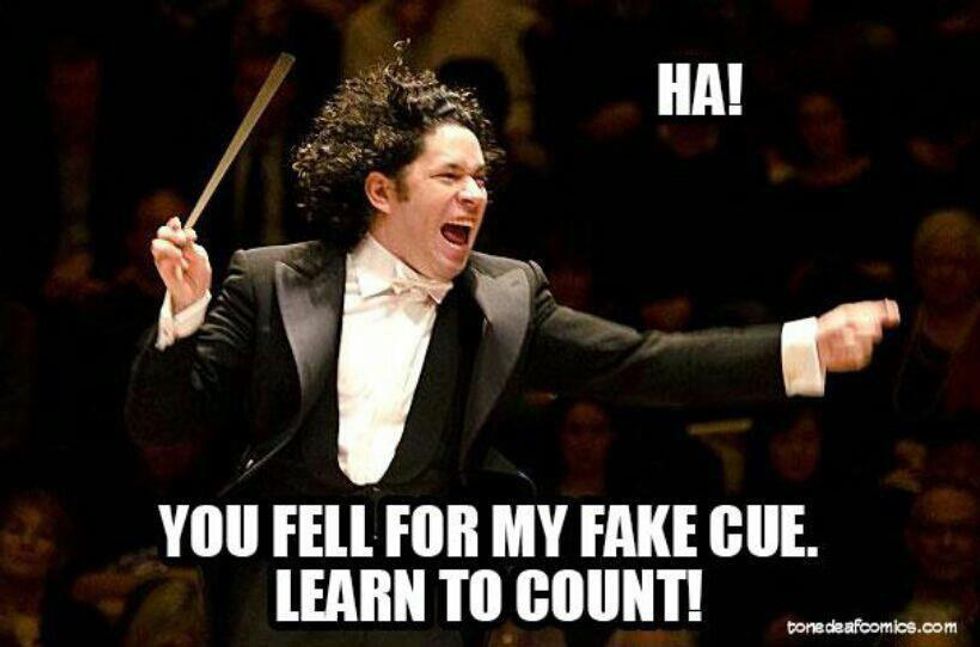As I was stressing myself over what to write for my first article, it finally hit me during jazz band, there should be a survival guide for music ensembles. Whether you are new to music ensembles or a seasoned professional, this guide should be applicable to everyone. (If not, you are probably doing something wrong and should reread this article from the beginning, but I digress.)
Tip #1: Actually show up on time and prepared. (That means have a pencil and your instrument, not just the case.)
Showing up is the first step to surviving any sort of ensemble, (this includes showing up to the ensemble of life, but we will get to that in a moment.) If you don't show up, there is no possible way you can personally get better, and not to mention you will probably receive some choice emails from the director. (Just as a fair warning, they can be either your best friend or your worst nightmare, so make sure you stay on their good side.)
Showing up though can only get you part of the way there. No one will be happy with you if you show up to rehearsal thirty minutes late. So be on time, and as the music world states, on time means early. (Except when it comes to actually starting concerts, you can't rush talent.)
Now, younger musicians are probably asking, "Why would you want to show up early? Then you are just sitting around doing nothing." Well, if you are an aspiring young musician you might as well wipe that idea out of your brain, just go ahead and place it in the trash. All good musicians take a little bit of time before each rehearsal, performance, and personal practicing, to take time and go through a good warm up. Warming up is essential to making sure that your instrument is in tune, working properly, and it just sets you up for the fantastic experience that you are about to have with your fellow ensemble mates.
Last part of this tip, make sure that you bring your instrument. (Vocalists, you don't have to worry about this one, since your instrument is technically attached to you, and unless an unfortunate accident is to fall upon you, you won't ever have to worry about forgetting it.) I remember back in high school, one of the most embarrassing days of my band experience, I had brought my trumpet case but not my trumpet. Yes, it sat, sad and alone next to my dad's piano, in my house, on its little stand. I remember seeing the look of utter disbelief and disappointment on my band director's face. Instead of making me suffer without being able to play during that rehearsal he gave me his sixty-year old cornet to play. It smelled like an old penny and every breath in caused me to gag from the overwhelming smell of musty nickel. Moral of the story is, bring your instrument and avoid playing old instruments that smell like an old penny.
Tip #2: Make sure to listen!
Do not sit passively during your ensemble rehearsal. Whether you are a vocalist or an instrumentalist, listening is a key component to what we do. This is how we locate problems, how we blend, and how we know how to adjust.
For beginning musicians, I understand, this can be very hard. With your attention on hitting the right notes and playing/singing the right rhythms, it can be extremely difficult to pick out which voices to listen to, but here is a tip. Make sure you are listening down to your lower voices and within your section. Eventually you will be able to distinguish whether the sound waves between your instrument and the person next to you is going too fast (sharp) or going too slow (flat). If you are still unsure, ask your director to help and make sure you use a tuner. They are a musician's friend.
Tip #3: Don't be afraid to make mistakes.
Mistakes are wonderful! Yes, I said it, wonderful! Especially during the beginning stages of learning pieces. Mistakes are learning opportunities and they help us understand where we may be a little shaky. So play loud and proud, (unless the music says to play piano, then play soft and proud). If you are playing timidly because you are afraid, the chances of making a mistake are so much higher. And no, it does not help to avoid playing a particular section because you are not sure that you know the rhythm or the notes. Just play out, it will draw attention to the director and let them know that this particular section isn't going to well and it needs to be reviewed.
Also, if you are afraid that those in your section or in the band will make fun of you because you are not playing so hot, calm down. The most important thing to remember about any ensemble and life, is that people do not think about you as much as you think they do. That complete disaster that you played, yeah, they won't remember it in the next five minutes, why? Because it isn't that important and that one mistake does not define who you are as a musician and a person. So, take heart, everyone makes mistakes, it is the strong few though that learn from it. As my brilliant roommate and fantastic bass clarinet player said, fail isn't a word, it is an acronym, which means, first attempt in learning.
(However, though this is true with most rehearsals this does not apply for when you have had the piece for a while or near concert time. If you are refusing to practice and that is causing you to make mistakes then you need to look at the next tip.)
Tip #4: Practice, Practice, Practice.
The ensemble can only get better if all of its members are taking the responsibility to practice. If one member is slacking off, then the whole band suffers. Do not be that guy. If you know that a part is tricky and you know that you keep missing it, take responsibility and get in that practice room. It is not going to magically get better between that day and the next rehearsal by just staring at it. It takes work and dedication. If you are not interested in putting in the time because you do not care, then you may want to rethink why you are in the ensemble to begin with., because ensembles have no room for selfish behavior. The band is one being and it demands respect. If you are not willing to sacrifice time and energy for the good of the ensemble, then frankly you don't belong there. But if you are willing to improve yourself and help those around you, then the benefits to being a part of these groups will definitely be a reward in of itself.
Moral of the story is, get in that practice room and go practice!
Tip #5: Trust yourself
I remember a time during my senior year of college (actually this was last week) when my fellow trumpet player who was playing with me on the first part was distracted because he got lost during a long rest. (Well, if we are being honest, he was trying to drop a pencil into one of the trombone straight mutes, but again, details, details, details. On the bright side, he did have a pencil, so that is a start.) As we got to the end of the rest, I raised my trumpet to come in, he did not. Uncertain of whether I missed counted or not, I hesitated and ended up coming in late. The confused and hurt look that my band director gave me was one that not only made me feel bad but also made me mentally smack myself. I knew I was right but I doubted myself in the last second. The lesson to learn here is, trust yourself, because 99.9% of the time, you are probably right.
Tip #6: Make sure to watch the director.
Every successful musician knows that the director is our friend. If a piece had a tempo change, funky rhythm, dynamic contrasts, awkward entrances, etc, the band director is usually on top of the ball and ready to help you out, but this only works if you are looking.
Now, I know the music can be entrancing, but if you refuse to look at the director, you can miss some of the many great, and sometimes hilarious faces that they use to help you out. For example, just Youtube Bernstein conducting, you will be enlightened to the importance of looking at the conductor.
Tip #7: Always remind yourself why you started music in the first place.
Let's all face it, us as musicians have come to a point in time in our music career where we become burned out. Practicing becomes a chore, music just doesn't hold that same excitement as it used too, and the idea of even sitting through a rehearsal makes us groan. This is normal, so don't be alarmed and do not panic. When times like this come up, it is important that we take a moment and reflect why we even decided to pick up an instrument or sing in the first place.
It may have been something as simple as your dad and you connected through playing your instrument together at home. It may have been that you were sitting at a musical performance and a certain piece moved you. Whatever the motivation was, it is important, and it became the cornerstone as to why you are where you are today. So to all of those musicians struggling to overcome the musical slump they have entered, just take a moment, and remind yourself of what it was that changed your life for the better. Once you have established this, you may be able to better understand that allowing this slump to get the better of you may take away the opportunity for some child to have the same revelation that you did.
This concludes my survival guide for participating in an ensemble, any other skills and tips you will pick up on the way, and if you feel like you are struggling, just retake a look at this list, and remember; life is 10% of what happens to you and 90% of how you respond to it. So if life gives you lemons, throw the lemons away and go practice, because anyone can make lemonade, but not everyone will think to make themselves a better musician.

























